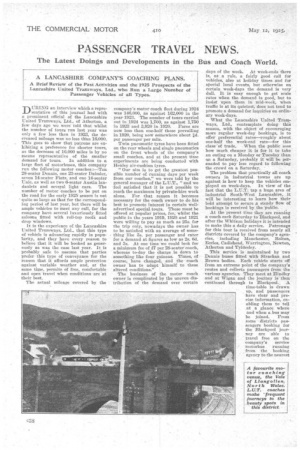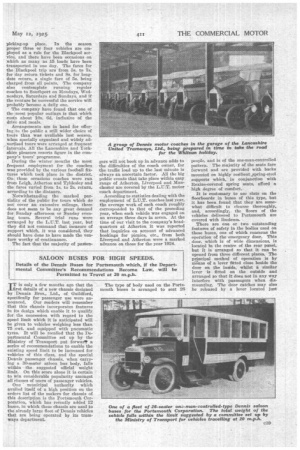PASSENGER TRAVEL NEWS.
Page 22

Page 23

If you've noticed an error in this article please click here to report it so we can fix it.
The Latest Doings and Developments in the Bus and Coach World.
A LANCASHIRE COMPANY'S COACHING PLANS.
A Brief Review of the Past Activities and the 1925 Prospects of the Lancashire United Tramways, Ltd., who Run a Large Number of Passenger Vehicles of all Types.
ITRING an interview which a repre sentative of this journal had with a prominent official of the Lancashire United Tramways, Ltd., of Atherton, a few days ago we were' told that whilst the number of tours run last year was only a few less than in 1923, the decreased mileage was no less than 16,040. This goes to show that patrons are exhibiting a preference for shorter tours, as the decrease of 16,000 miles is by no means representative of the smaller
demand for tours. In addition to a large fleet of motorbuses, this company run the following motor coaches:—Ten 28-seater Dennis, one 23-seater Daimler, seven 14-seater Fiats, and one 14-seater Unic, as well as two 6-seater Austin landauiets and several light cars. The number of motor coaches to be put on the road for the early 1925 'season is net quite so large as that for the corresponding period of last year, but there will be ample vehicles to meet any call, for the company have several luxuriously fitted saloons fitted with roll-top roofs and drop windows.
It is the experience of the Lancashire United Tramways, Ltd., that this type of vehicle is advancing rapidly in popularity, and they have every reason to believe that it will be booked as generously as was the case last year. It is probably safe to assume_ that parties prefer this type of conveyance for the reason that it affords ample 'protection against variable weather and, at the same time, permits of free, comfortable and open' travel when conditions are -at their best.
The actual mileage covered by the company's motor coach fleet during 1924 was 146,000, as against 162,000 in the year 1923. The number of tours carried out in 1924 was 1,700, as against 1,750 in 1923 and 3,920 in ;1920. Pares are now less than one-half those prevailing in 1920, being now soinewhrire about ad. per passenger per mile. Twin pneumatic tyres have been fitted on the rear wheels and single pneumatics on the front wheels of the company's small coaches, and at the present time experiments are being conducted with Henley air-cushion tyres.
" Our aim is to get the greatest possible number of running days per week from our coaches," 11,6 were told by the general manager of the L.15.T., "and we feel satisfied that it is not possible to reach the maximum by private-hire work alone. For that reason it becomes necessary for the coach owner to do his beet to promote interest in certain welladvertised special tours. These must be offered at popular pries, for, whilst the public in the years 10.9, 1920-and 1921 were willing to pay as much as 25s for the trip only, nowadays the owner has to be satisfied with 2.4 average of something like 5s. per passenger and cater for a demand at figures as low as 2s, (id. and 3s. At one time:we could look for a minimum fee of £7 per 28-seater coach, whereas to-day the charge is down to something like four guineas. Times, of course, have changed, and the coach owner has to adapt • himself to these altered conditions." !
The business of the motor coach owner is complicated by the uneven• dietribution of the demand over certain
days of the week. At week-ends there is, as . a rule, a fairly good call for
vehicles, also at holiday times and for sPecial local events, but otherwise on certain week-days the demand is very.
dull. It is easy enough to get scale rates when the demand is good, but to
insist upon them in mid-week, when traffic is at its quietest, does not tend to promote a demand for inquiries on ordinary week-days.
What the Lancashire United Tramways, Ltd., contemplate doing this season, with the object of encouraging more regular week-day bookings, is to offer preferential rates—roughly about one-half the week-end rate—for this class of trade. When the public sties haw much cheaper it is for it to take an outing on a Monday or Tuesday than tin a Saturday, probably it will be persuaded to pay less regard to following the crowd on a Saturday.
The problem that practically all coach owners in industrial towns are up against is haw to keep the vehicles em ployed on week-days. In view of the fact that the L.U.T. tap a huge area of
industrial South-West Lancashire, it will be interesting to learn how their bold attempt to secure A steady flow of bookings is received by the 'public.
At the present time they are running a coach each Saturday to Blackpool, and after the Whitsun holidays it is intended to make this a daily service. Patronage for this tour is received from nearly all districts covered by the company's agencies, including Manchester, Bolton, Eccles, Cadishead, Warrington, Newton, Atherton and Tyldesley.
This service is maintained by two Dennis buses fitted with Strachan and Brown bodies. Each vehicle starts off from an extreme point of the company's routes and collects passengers from the various agencies: They meet at Hindley and at Wigan and the journey is then continued thraugh to Blackpool., A time-table is drawn up, and passengers have clear and pre
cise information, enabling them to tell. at a glance where and when a bus may be joined. From some districts passengers booking for the Blackpool journey are abie to travel free on the company's service motorbus running from the booking agency to the nearest picking-up place. In the season proper three or four vehicles are employed as a rule for the Blackpool service, and there have been occasions on which as many as 15 loads have been transported in one day. The fares for the Blackpool trip are from 52. to 7s. for day return tickets and 8.s. for longdate return, a single fare of 5s. being charged from all points. The company also contemplate running regular coaches to Southport on Mondays, Wednesdays, Saturdays and Sundays, and if the venture be successful the service will probably become a daily One.
The company have found that one of the most popular outings is that which costs about 10s. fid. inclusive of the drive and meals.
Arrangements are in hand for offering to the public a still wider choice of tours than was available last season, when specially organized and widely advertised tours were arranged at frequent intervals. All the Lancashire and Yorkshire pleasure resorts figure in the company's tours' programme During the winter months the most frequent employment for the coaches was provided by the various football Bic-tures which took place in the district. On. these occasions coaches were run from Leigh, Atherton and Tyldesley and the fares varied from is. to 2s. return, according to the distance.
Notwithstanding the marked partiality of the public for tours which do not cover an extensive mileage, there does not seem to be any great demand for Sunday afternoon or Sunday evening tours. Several trial runs were arranged by the L.U.T. last year, but they did not command that Measure of support which, it was considered, they should have done to have made the venture worthy of continuance.
The fact that the majority of paggen gers will not book up in advance adds to the difficulties of the coach owner, for the traffic load up to the last minute is always an uncertain factor. All the big public events that take place within easy range of Atherton, Liverpool and Manchester are covered by the L.IT.T. motor coach department.
According to statistics dealing with the employment of L.U.T. coaches last year, the average work of each coach roughly corresponded to that of the preceding year, when each vehicle was engaged on an average three days in seven. At the time of our visit to the company's headquarters at Atherton it was reported that inquiries on account of advanced bookings for picnics, etc., from both Liverpool and Atherton were a marked advance on those for the year 11)24.
































